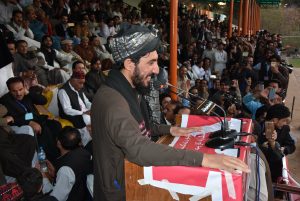Manzoor Ahmad Pashteen, recognized for his iconic red hat and outspoken criticism of Pakistan’s powerful military for inciting violence and instilling fear in the Pashtun lands, went missing on December 4.
In the volatile Pashtun belt straddling the Durand Line – a 1,660-mile 19th-century separation between Afghanistan and Pakistan stretching from China to Iran – violence, bloodshed, alleged extrajudicial killings, and abductions shape the landscape.
Pashteen, the leader of the Pashtun Tahafuz Movement – a civil rights movement advocating for the rights of the Pashtun ethnic group – addressed a rally in Chaman, Balochistan, advocating for free border crossings between Pakistan and Afghanistan. While en route to Turbat town, where Baloch activists were protesting state-inflicted injustices, he was arrested.
Conflicting accounts emerged of what happened: Eyewitnesses claimed Pakistani forces fired at Pashteen’s vehicle, injuring a passerby, while authorities accused Pashteen’s supporters of initiating the gunfire. Pashteen was detained during the encounter. Following the arrest, his whereabouts remained unknown.
This sudden turn of events amplified fears about the safety and well-being of the civil rights leader. Thousands flooded social media, demanding that the Pakistani government reveal Pashteen’s whereabouts. The hashtags #whereismanzoorpashteen and #releasemanzoorpashteen trended on X (formerly Twitter), amplifying the calls for answers.
In Pakistan, enforced disappearances often result in permanent absences, a reality echoed by the ongoing protests of Baloch mothers and sisters searching for their missing loved ones. The U.S. State Department’s 2022 Country Reports on Human Rights Practices outlined significant human rights concerns in Pakistan, including reports of unlawful or arbitrary killings, extrajudicial killings, forced disappearances, torture by government agents, and ongoing disappearances and arbitrary arrests.
In Pashteen’s case, a turning point emerged three days later. On December 7, he appeared before an Islamabad court handcuffed and with his head covered in a black sack – a sight reminiscent of those arrested on terrorism charges since the onset of the United States’ War on Terror in 2001. Reports indicated that the Islamabad court granted him a seven-day remand.
“Lodging cases of terrorism against Manzoor Pashteen is highly condemnable because he only asks for peace in his own land,” a Pakistani advocate, Ahmad Shafiq, stated on X.
The extensive outcry surrounding Pashteen’s arrest, including from Pakistan’s non-Pashtun community, underscores the persistent frustration within the nation’s political and social spheres.
Born to a local teacher and his wife in South Waziristan, Manzoor Pashteen entered a world where conflicts, poverty, and limited educational access deprive countless children of learning opportunities. Undeterred by these challenges, he pursued veterinary studies and swiftly gained immense popularity among millions of Pashtuns through his early activism. The name “Manzoor,” roughly translating to “accepted,” symbolizes the hope he instilled in a community denied basic rights and opportunities.
As the second-largest ethnic group in Pakistan, the Pashtuns constitute up to a reported 20 percent of the country’s estimated over 235 million population, as reported by the World Bank. Millions of Pashtuns live in Afghanistan, separated by the disputed Durand Line. Since Pakistan’s establishment as an independent country in 1947, the central government’s authority has seriously been challenged in this region.
In 2018, Manzoor Pashteen initiated the Pashtun Tahafuz Movement (PTM) as a response to Pakistan’s extensive military campaigns in the Pashtun belt, which uprooted hundreds of families, razed towns, and resulted in thousands of dead, displaced, and injured in the region. The PTM has since organized protests to end extrajudicial killings, enforced disappearances, racial profiling, and harassment of Pashtuns and also called for demining in the insurgency-wreaked region of Khyber Pakhtunkhwa formerly known as the Federally Administered Tribal Areas (FATA).
Pashteen’s birthplace, Waziristan, comprises extensive mountainous terrain, nearly the size of Puerto Rico, with elevations reaching up to 2,100 meters above sea level. These mountains are adorned with pine trees and dense forests, concealing a trove of valuable minerals like chromite, copper, granite, magnesia, and manganese, as well as substantial gas and oil reserves.
Pashteen claimed that Pakistan’s military campaigns weren’t solely aimed at combating terrorism but rather at destabilizing the social fabric and exploiting natural resources in the area. And he accused Pakistan’s military of supporting and funding militant groups to perpetuate volatility across the region.
Despite the picturesque landscape, severe poverty and a lack of basic human rights have plagued the Pashtun community. Years of conflict have left the region riddled with landmines, significantly impacting the area’s development and safety.
Nonetheless, the fight for Pashtun rights in Pakistan is an enduring narrative, and Pashteen represents a recent chapter in this long-standing struggle. His plight draws parallels to the tribulations faced by Bacha Khan Baba, a revered Pashtun peace advocate and confidant of Mahatma Gandhi. He too endured years of imprisonment in Pakistan. In the 1960s, Bacha Khan Baba was declared a prisoner of conscience by Amnesty International; he’s interred in Afghanistan, symbolizing a peaceful protest against Pakistan’s actions against the rights of the Pashtuns.
There is a notable difference, however: Khan Baba advocated for the autonomy of Pashtun territories whereas Pashteen’s demands are aligned with Pakistan’s constitutional framework.
It’s puzzling that the government of Pakistan arrested Pashteen, an anti-war advocate who shares concerns with the Pakistani government regarding unauthorized militant group activities. For instance, he strictly opposes the Tehreek-e-Taliban Pakistan, a group viewed as a threat by the Pakistani government. The arrest of anti-war and anti-militancy activists in Pakistan appears contradictory to their cause. Pashteen, restricted from international travel by Pakistan’s regulations, faced media silence in contrast to the prominence of news surrounding militant activities.
Legal proceedings involving Pashteen are ongoing, and a resolution may take some time. Meanwhile, serious concerns remain about his safety.
His supporters will continue protesting worldwide. On December 6, his supporters assembled outside the White House, advocating for his safe release. Another group plans to stage a similar protest on December 9 outside the International Criminal Court (ICC) in The Hague.

































